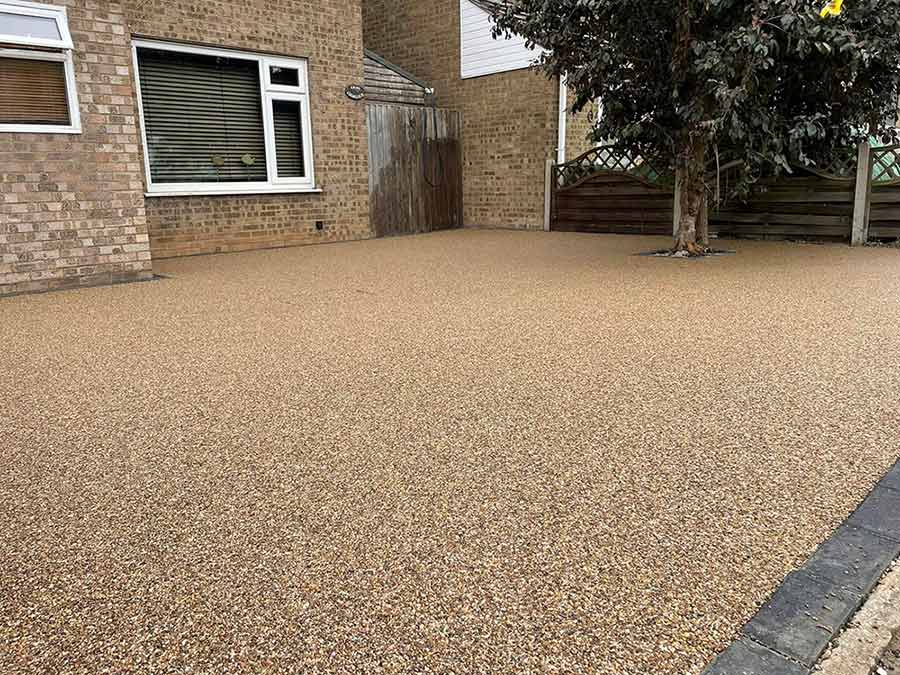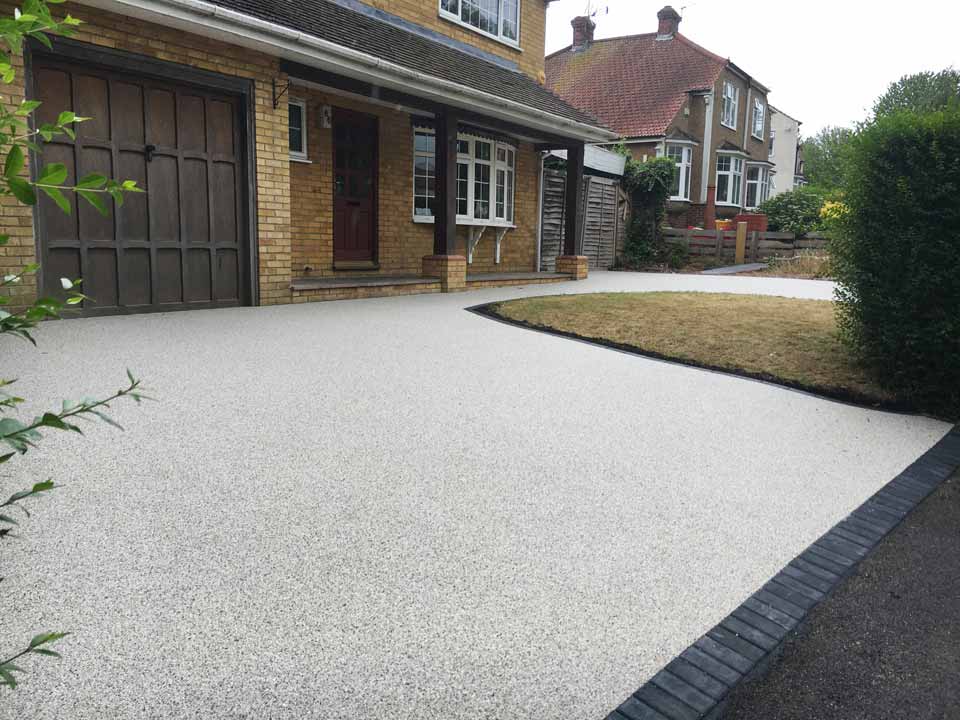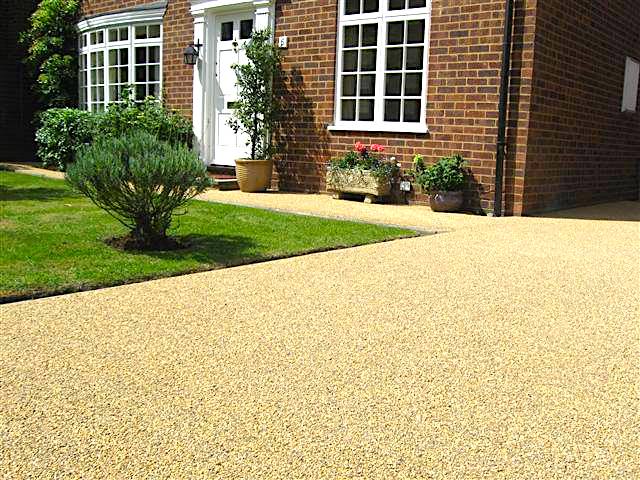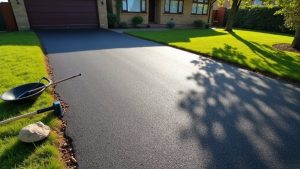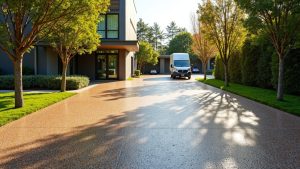Resin driveways are a relatively new addition to the world of landscaping and construction, but they have already made a significant impact on the environment. These driveways are not only aesthetically pleasing, but they also offer a range of environmental benefits that make them a popular choice for homeowners and businesses alike.
In fact, the benefits of resin driveways are so significant that they have been hailed as a revolutionary solution to some of the most pressing environmental issues of our time.
Resin driveways are a porous surface that allows for natural filtration and drainage, reducing surface runoff and pollution. This means that rainwater can easily seep through the surface and into the ground, where it can be naturally filtered and purified. This is a significant benefit, as surface runoff is a major contributor to water pollution and can have devastating effects on aquatic ecosystems.
Additionally, resin driveways are a sustainable alternative to traditional surfaces, as they are made from recycled materials and require minimal maintenance. By choosing a resin driveway, homeowners and businesses can reduce their environmental impact and contribute to a more sustainable future.
Table of Contents
TogglePorous Surface for Natural Filtration and Drainage
The implementation of a porous surface in resin driveways facilitates natural filtration and drainage, promoting a sustainable and eco-friendly approach to surface water management. Permeable paving is an innovative solution that allows water to infiltrate the ground, reducing the amount of runoff and pollution that enters our waterways.
The porous surface allows rainwater to be absorbed into the ground, which reduces the amount of water that flows into stormwater drains and ultimately ends up in our rivers and oceans. Eco-friendly driveways also help prevent flooding and erosion by allowing water to slowly seep into the ground instead of flowing over the surface.
By reducing the amount of surface water runoff, we can also reduce the amount of pollutants that are carried into our waterways. This is an environmentally responsible way to manage surface water, and it is a step towards a more sustainable future.
The reduction of surface runoff and pollution is just one of the many benefits of resin driveways, making them an excellent choice for those who want to make a positive impact on the environment.

Reduction of Surface Runoff and Pollution
Minimising surface runoff and pollution is crucial for preserving the quality of our natural water systems. Resin driveways are an effective way to achieve this goal. Unlike traditional surfaces, such as concrete or asphalt, resin driveways are permeable and allow water to seep into the ground. As a result, they decrease the amount of surface runoff, which can carry pollutants and chemicals into nearby water sources.
Rainwater harvesting is another potential benefit of resin driveways. The excess water that is not absorbed by the ground can be collected and reused for other purposes, such as watering plants or flushing toilets. Additionally, resin driveways can be incorporated into green infrastructure practices, which involve using natural systems to manage stormwater and reduce pollution.
By implementing resin driveways, homeowners and businesses can contribute to a more sustainable and environmentally-friendly future. Resin driveways not only reduce surface runoff and pollution but also provide an opportunity for rainwater harvesting and green infrastructure. By choosing a sustainable alternative to traditional surfaces, individuals can make a positive impact on the environment and help preserve the quality of our natural water systems.
Sustainable Alternative to Traditional Surfaces
A viable option for reducing surface runoff and preserving water quality is to opt for permeable surfaces, which allow water to seep into the ground. Resin driveways offer an eco-friendly option and a long-lasting solution. Here are three reasons why:
- Resin driveways are made of materials that are environmentally friendly. The materials used to create resin driveways are not only long-lasting and durable, but they are also recyclable. This means that when the time comes to replace your driveway, the materials can be reused, reducing waste and limiting the environmental impact.
- Resin driveways are permeable, allowing water to seep into the ground. This means that they can help to reduce surface runoff and preserve water quality. By allowing water to seep into the ground, resin driveways help to replenish groundwater resources, which is essential for the health of our ecosystems.
- Resin driveways require little maintenance. Unlike traditional surfaces, which require regular cleaning and upkeep, resin driveways are low-maintenance. This means that they are a sustainable alternative to traditional surfaces, as they require less water, energy, and resources to maintain.
Resin driveways offer an eco-friendly option and a long-lasting solution for reducing surface runoff and preserving water quality. The material used to create resin driveways is environmentally friendly, and the driveways themselves are permeable, requiring little maintenance.
In the next section, we will discuss how urban development can negatively impact water resources and ways to mitigate these impacts.
Mitigating Negative Impacts of Urban Development on Water Resources
Mitigating the negative impacts of urban development on water resources requires a comprehensive approach that addresses not only surface runoff but also the quality of water in streams and rivers.
Green infrastructure, such as resin driveways, can play a crucial role in this approach. By using permeable materials, resin driveways allow rainwater to infiltrate the ground instead of contributing to surface runoff, which can cause erosion, flooding, and water pollution.
This not only helps to reduce the risk of urban flooding but also helps to replenish groundwater resources, which are often depleted in urban areas.
In addition to reducing surface runoff, resin driveways can also help to improve the quality of water in streams and rivers. Traditional surfaces, such as concrete and asphalt, can contribute to water pollution by allowing pollutants to accumulate on their surfaces and then washing into waterways during rain events.
Resin driveways, on the other hand, are less likely to accumulate pollutants and can be designed to incorporate water filtration systems that remove pollutants before the water enters the ground.
By using resin driveways and other green infrastructure, urban water management can become more sustainable and help to protect the health and safety of both people and the environment.
Frequently Asked Questions
How long do resin driveways last compared to traditional surfaces?
Life expectancy comparison shows that resin driveways outlast traditional surfaces due to their durability factors. Resin driveways have a longer lifespan and require less maintenance, making them a cost-effective and sustainable solution for homeowners.
Can resin driveways be installed in cold climates where there is frequent snow and ice?
Resin driveways are durable and offer resistance to snow and ice, making them suitable for installation in cold climates. Their ability to withstand weather conditions helps ensure safety for users and longevity for the driveway.
Are resin driveways more expensive than traditional surfaces?
Resin driveway cost comparison shows that while resin driveways may be initially more expensive than traditional surfaces, they offer long-term benefits such as durability, low maintenance, and improved curb appeal. Investing in resin driveways can provide a safer and more sustainable option for homeowners.

Do resin driveways require special maintenance or cleaning procedures?
Resin driveways require low maintenance, only needing occasional sweeping and jet washing. Cleaning techniques involve using a mild detergent and warm water. Unlike traditional surfaces, they do not require regular resealing or repainting, making them a cost-effective and durable option.
Can resin driveways be customised with different colors or designs?
Resin driveways offer a range of color customisation and design options, making them a popular choice for homeowners. This allows for a personalised touch to match any aesthetic.
Conclusion
Resin driveways are a sustainable and eco-friendly alternative to traditional surfaces. The use of porous materials in their construction allows for natural filtration and drainage, reducing the amount of surface runoff and pollution. This is particularly important in urban areas where high levels of impervious surfaces can have a detrimental impact on water resources. Resin driveways mitigate these negative impacts by allowing water to seep through and be filtered by the ground.
Moreover, the benefits of resin driveways extend beyond their environmental impacts. They are durable, low-maintenance, and come in a variety of colours and designs, making them a versatile option for homeowners and businesses alike. In addition, resin driveways can be installed over existing surfaces, eliminating the need for costly excavation and disposal of old materials.
Despite these benefits, some may argue that resin driveways are not as visually appealing as traditional surfaces such as asphalt or concrete. However, advances in technology have allowed for a wide range of customisation options, including the ability to mimic the look of natural stone or brick.
Additionally, the long-term savings in maintenance and environmental benefits make resin driveways a smart choice for those looking to make a positive impact on their surroundings.
In conclusion, the environmental benefits of resin driveways cannot be understated. They offer a sustainable and practical solution to the negative impacts of urban development on water resources. With their durability, low-maintenance, and aesthetic customisation options, resin driveways are a smart choice for homeowners and businesses looking to make a positive impact on the environment.
Would your property benefit from a new, state of the art resin drive in Manchester? Contact us for a no obligation quote on 0161 917 2477 / 07990 967423 or visit our website.
Whilst it is true that there are certain conditions required in order to lay a resin bound stone patio, pathway Read more
If your driveway is looking old and tired, a new one can help revamp your property. Modern driveways are available Read more
APPROVED RESIN BOUND DRIVEWAY INSTALLERS LOCAL TO YOU! Find out More Get in Touch Get a Free Quote Book an Read more

